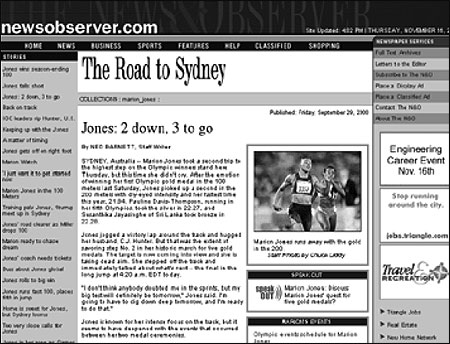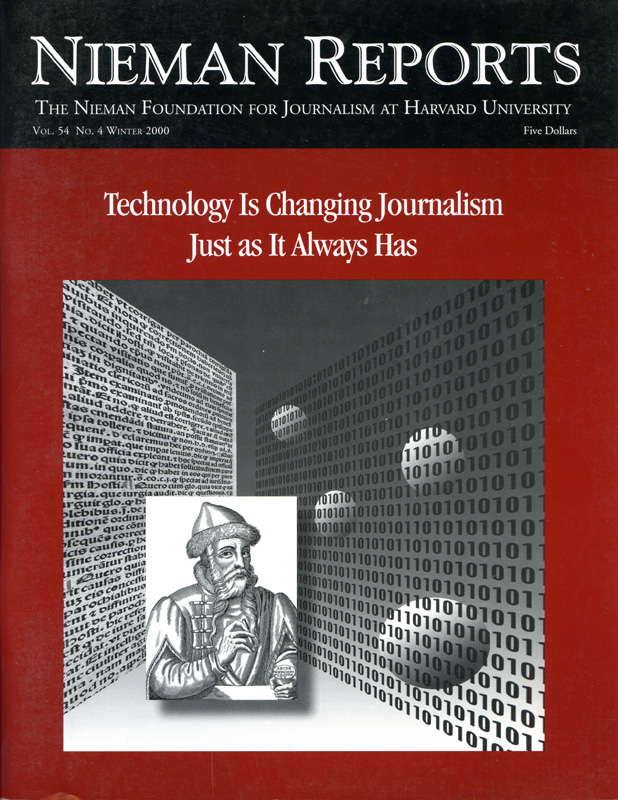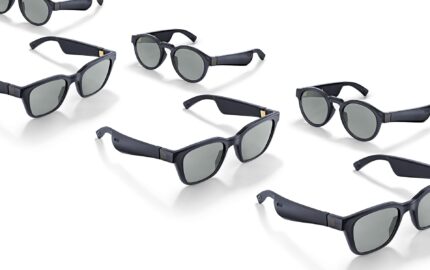The way in which Americans “watched” the 2000 Olympic Games from Sydney raised a significant question: How much longer will exclusive broadcast rights hold sway over the way that viewers take in these events? What these Olympics revealed is the emerging wired world, as people went to the Internet for results rather than await a prime-time revelation from NBC. And ratings—for a variety of reasons—suffered.
This truly is the era of the storied Jim McKay introduction to the ABC sports anthology series in which he beckoned viewers to come along as cameras spanned the globe for athletic competition. Only now, viewers at home are doing so increasingly at their convenience, giving rise to the prospect that as video and audio get easier to transmit and hand-held computers make that information easier to receive, anytime, anywhere, consumers will be their own programmers, and will not wait for scheduled programs. For example, a TV crew without broadcasting rights to the Sydney Games could not have sent images and audio from the competition up to a satellite for broadcast at a local station. But if someone with a digital camera sits in the stands and transmits streaming video back home, can that be prohibited? More and more, situations like these are going to need to be addressed.
The rapid advancement of technology is going to make transmission easy and so widely available that all the video cameras now capturing images might soon be quite capable of sending those images to Web sites, e-mail accounts, home TV’s, and enough sources that exclusivity won’t hold up. So local track clubs might get immediate coverage of events. Aficionados of events not considered widely popular might arrange their own loosely operated network of presentation. And college students could get an instant look at athletes from their schools.
Information no longer will wait. News can’t be contained. There simply are too many sources. And with the Internet, what once was a fountainhead is now Niagara Falls.
NBC television was the U.S. focal point of the Sydney Games, but a worldwide audience went to the Internet for Olympics news. Cruel though the circumstances might have seemed, the NBC Web site (nbcolympics.com) drew more than 66 million page views from home audiences surfing the Net. That’s an average of more than four million page views daily during the Olympics, according to The Nielsen//NetRatings Web Olympics Index. (The survey of 165,000 United States and foreign Internet users was conducted September 16 through October 1 through a partnership formed by NetRatings, Nielsen Media Research, and ACNielsen.)
More than 56 million page views were recorded for olympics.com, the official Olympic Web site, and sports.yahoo.com/olympics garnered more than 46 million page views. On Yahoo!, interest built as the site documented a 650 percent increase in traffic during a four day period at the start of the Olympics. Because of the exponential growth of the Internet, these figures will prove significant to those who are planning coverage of the 2004 Games in Athens. In 1996, NBC had two full-time staff on its Web site for the Atlanta Olympics. For the 2000 Web site, NBC had 40 full-time staff and 100 part-time staff in Sydney and 150 staff in San Francisco to drive the network site as well as MSNBC.com, the cable affiliate.
With the 15-hour time difference, the Sydney Games were the perfect games for the Internet, Kevin Monaghan, NBC vice president for business development, told the Atlanta Constitution in a July interview. So perfect for the Internet that the compelling Nielsen Web numbers contrasted with the tepid Nielsen TV numbers read like a tale of two technologies, yesterday’s and tomorrow’s. NBC paid $705 million for the broadcasting rights to the Sydney Games and attracted, on average, slightly more than 14 million households, the lowest rated Olympics since Mexico City in 1968. The 13.8 rating the Olympics broadcast drew over 17 nights was well below the 17.5 to 18.5 ratings forecast by executives at NBC Sports. (NBC promised sponsors a 16.1 rating, according to The Associated Press.) Cable channels MSNBC and CNBC both averaged a .7 (seven-tenths) on their Olympics coverage. (Each rating point represents about one million U.S. homes with television. For the cable channels, a point equals 760,000 households for CNBC and 650,000 for MSNBC.)
Don’t cry for NBC. Even with the rights fees, another $100 million in production costs, and an agreement to extend additional commercial time to sponsors to make good on audience exposure, NBC still projects profit in the tens of millions of dollars, executives told AP. But the trend suggests that as technology becomes more available for individual use, the networks’ capacity to deliver big audiences will continue to be diminished. That could change expectations for what is paid for exclusive rights and even draw into question whether broadcasting rights can continue to be exclusive. In this age of new media and technology, there is clearly a lack of monopoly.
NBC presented “the wait-and-see Games,” wrote Mark Hyman in Business Week. It’s reasonable to presume, then, that the Athens Games will be Internet-observant (as will the Salt Lake City games during the winter of 2002.) In 1999, the number of online households exceeded 40.5 million, and by 2004, 67 million U.S. households will be online, according to Veronis and Suhler’s Communications Industry Forecast.
The International Olympic Committee (IOC) will be discussing Internet coverage plans for the 2004 Games at Athens at a December meeting. In Sydney, the IOC prohibited athletes from sending their own stories or journal entries out to Internet sites. This time, one issue is whether real-time video can be posted on the Internet. With so many Internet users at home and in offices with the ability to use broadband communications, streaming video and RealAudio, keeping an embargo on Olympics results—not to mention on event coverage itself—will present daunting challenges to those who have a stake in retaining the exclusivity of coverage. Think of the IOC trying to control a technology that no one can control. What comes to mind is that little Dutch boy’s finger.
President Clinton’s promise of a computer in every classroom has implications far beyond lessons learned for school. There will certainly come a time when kids no longer need to teach their parents about using a computer. And when that day comes, Dean Jutilla, public relations manager at Yahoo!, contends that will mean a big difference in media use and preference. Already a study by Cyber Dialogue reports that one-third of Internet users say they watch less television as a result of Internet use. The Internet is by far the fastest growing media technology: 38 years passed before 50 million Americans had access to radio; 13 years before 50 million Americans bought television. Yet 50 million Americans had access to the Internet in five years, according to the Information Technology Association of America. In 1996, only three percent of U.S. classrooms were linked to the Internet. Now more than 90 percent are.
Live coverage has been the staple of sports broadcasting for a generation. Will a nation of computer-outfitted households ever again be content to watch prime-time events that end hours before they are telecast? The pace of new technology development means that audiences might be able to catch live events while they, too, are on the run, by using their palm-size computers showing a streaming video of events.
The 2000 Olympics offered a glimpse into the information future. That glimpse must be terrifying for some, including those who rely on enormous rights fees to stage events such as the Olympics. For others the glimpse is exciting, even exhilarating, as technology will no doubt emerge in ways not even imagined by those who now jog with CD stereo sound, drive while using cellular telephones, and are always plugged in through their laptop computers. Who knows? By 2002, skiers in New Hampshire might be watching a downhill Olympic race on their handheld Webs while sitting in a gondola going back up the mountain for another run.

A Web story from The (Raleigh) News & Observer, September 29, 2000, reporting Marion Jones’s win in the 200 meters. The story appeared on the Web before the race was seen on U.S. television.
Gerald B. Jordan, a 1982 Nieman Fellow, is associate professor in The Walter J. Lemke Department of Journalism at the University of Arkansas.
This truly is the era of the storied Jim McKay introduction to the ABC sports anthology series in which he beckoned viewers to come along as cameras spanned the globe for athletic competition. Only now, viewers at home are doing so increasingly at their convenience, giving rise to the prospect that as video and audio get easier to transmit and hand-held computers make that information easier to receive, anytime, anywhere, consumers will be their own programmers, and will not wait for scheduled programs. For example, a TV crew without broadcasting rights to the Sydney Games could not have sent images and audio from the competition up to a satellite for broadcast at a local station. But if someone with a digital camera sits in the stands and transmits streaming video back home, can that be prohibited? More and more, situations like these are going to need to be addressed.
The rapid advancement of technology is going to make transmission easy and so widely available that all the video cameras now capturing images might soon be quite capable of sending those images to Web sites, e-mail accounts, home TV’s, and enough sources that exclusivity won’t hold up. So local track clubs might get immediate coverage of events. Aficionados of events not considered widely popular might arrange their own loosely operated network of presentation. And college students could get an instant look at athletes from their schools.
Information no longer will wait. News can’t be contained. There simply are too many sources. And with the Internet, what once was a fountainhead is now Niagara Falls.
NBC television was the U.S. focal point of the Sydney Games, but a worldwide audience went to the Internet for Olympics news. Cruel though the circumstances might have seemed, the NBC Web site (nbcolympics.com) drew more than 66 million page views from home audiences surfing the Net. That’s an average of more than four million page views daily during the Olympics, according to The Nielsen//NetRatings Web Olympics Index. (The survey of 165,000 United States and foreign Internet users was conducted September 16 through October 1 through a partnership formed by NetRatings, Nielsen Media Research, and ACNielsen.)
More than 56 million page views were recorded for olympics.com, the official Olympic Web site, and sports.yahoo.com/olympics garnered more than 46 million page views. On Yahoo!, interest built as the site documented a 650 percent increase in traffic during a four day period at the start of the Olympics. Because of the exponential growth of the Internet, these figures will prove significant to those who are planning coverage of the 2004 Games in Athens. In 1996, NBC had two full-time staff on its Web site for the Atlanta Olympics. For the 2000 Web site, NBC had 40 full-time staff and 100 part-time staff in Sydney and 150 staff in San Francisco to drive the network site as well as MSNBC.com, the cable affiliate.
With the 15-hour time difference, the Sydney Games were the perfect games for the Internet, Kevin Monaghan, NBC vice president for business development, told the Atlanta Constitution in a July interview. So perfect for the Internet that the compelling Nielsen Web numbers contrasted with the tepid Nielsen TV numbers read like a tale of two technologies, yesterday’s and tomorrow’s. NBC paid $705 million for the broadcasting rights to the Sydney Games and attracted, on average, slightly more than 14 million households, the lowest rated Olympics since Mexico City in 1968. The 13.8 rating the Olympics broadcast drew over 17 nights was well below the 17.5 to 18.5 ratings forecast by executives at NBC Sports. (NBC promised sponsors a 16.1 rating, according to The Associated Press.) Cable channels MSNBC and CNBC both averaged a .7 (seven-tenths) on their Olympics coverage. (Each rating point represents about one million U.S. homes with television. For the cable channels, a point equals 760,000 households for CNBC and 650,000 for MSNBC.)
Don’t cry for NBC. Even with the rights fees, another $100 million in production costs, and an agreement to extend additional commercial time to sponsors to make good on audience exposure, NBC still projects profit in the tens of millions of dollars, executives told AP. But the trend suggests that as technology becomes more available for individual use, the networks’ capacity to deliver big audiences will continue to be diminished. That could change expectations for what is paid for exclusive rights and even draw into question whether broadcasting rights can continue to be exclusive. In this age of new media and technology, there is clearly a lack of monopoly.
NBC presented “the wait-and-see Games,” wrote Mark Hyman in Business Week. It’s reasonable to presume, then, that the Athens Games will be Internet-observant (as will the Salt Lake City games during the winter of 2002.) In 1999, the number of online households exceeded 40.5 million, and by 2004, 67 million U.S. households will be online, according to Veronis and Suhler’s Communications Industry Forecast.
The International Olympic Committee (IOC) will be discussing Internet coverage plans for the 2004 Games at Athens at a December meeting. In Sydney, the IOC prohibited athletes from sending their own stories or journal entries out to Internet sites. This time, one issue is whether real-time video can be posted on the Internet. With so many Internet users at home and in offices with the ability to use broadband communications, streaming video and RealAudio, keeping an embargo on Olympics results—not to mention on event coverage itself—will present daunting challenges to those who have a stake in retaining the exclusivity of coverage. Think of the IOC trying to control a technology that no one can control. What comes to mind is that little Dutch boy’s finger.
President Clinton’s promise of a computer in every classroom has implications far beyond lessons learned for school. There will certainly come a time when kids no longer need to teach their parents about using a computer. And when that day comes, Dean Jutilla, public relations manager at Yahoo!, contends that will mean a big difference in media use and preference. Already a study by Cyber Dialogue reports that one-third of Internet users say they watch less television as a result of Internet use. The Internet is by far the fastest growing media technology: 38 years passed before 50 million Americans had access to radio; 13 years before 50 million Americans bought television. Yet 50 million Americans had access to the Internet in five years, according to the Information Technology Association of America. In 1996, only three percent of U.S. classrooms were linked to the Internet. Now more than 90 percent are.
Live coverage has been the staple of sports broadcasting for a generation. Will a nation of computer-outfitted households ever again be content to watch prime-time events that end hours before they are telecast? The pace of new technology development means that audiences might be able to catch live events while they, too, are on the run, by using their palm-size computers showing a streaming video of events.
The 2000 Olympics offered a glimpse into the information future. That glimpse must be terrifying for some, including those who rely on enormous rights fees to stage events such as the Olympics. For others the glimpse is exciting, even exhilarating, as technology will no doubt emerge in ways not even imagined by those who now jog with CD stereo sound, drive while using cellular telephones, and are always plugged in through their laptop computers. Who knows? By 2002, skiers in New Hampshire might be watching a downhill Olympic race on their handheld Webs while sitting in a gondola going back up the mountain for another run.

A Web story from The (Raleigh) News & Observer, September 29, 2000, reporting Marion Jones’s win in the 200 meters. The story appeared on the Web before the race was seen on U.S. television.
Gerald B. Jordan, a 1982 Nieman Fellow, is associate professor in The Walter J. Lemke Department of Journalism at the University of Arkansas.



